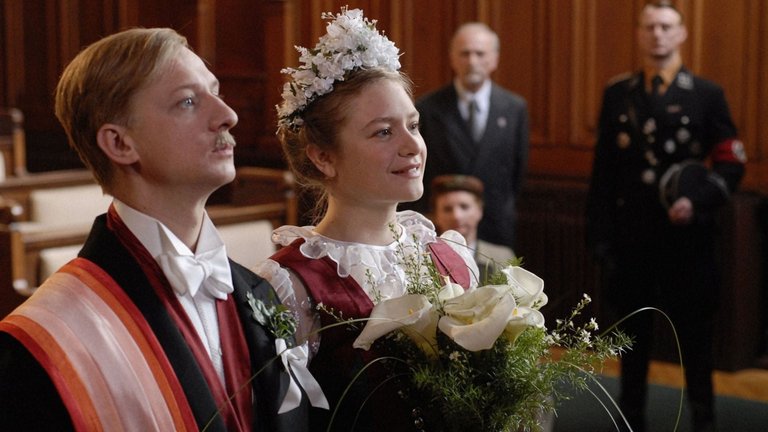Film Review: I Served the King of England (Obsluhoval jsem anglického krále, 2006)

Jiří Menzel stands out as one of those rare filmmakers who achieved remarkable acclaim with his feature debut. His 1966 film, Closely Watched Trains, a black comedy set against the backdrop of World War II, won the Oscar for Best Foreign Language Film. Despite this auspicious beginning, Menzel struggled to replicate such success throughout his career, although many of his subsequent works garnered prestigious awards and enjoyed popularity, particularly in the West. Critics often viewed his unique brand of Czech humour as an indirect yet ingeniously subversive critique of the Communist regime in Czechoslovakia. Following the end of the Cold War, Menzel produced fewer films, yet some, including his 2006 period black comedy I Served the King of England, continued to attract attention and provoke discussion.
The film is adapted from the eponymous 1973 novel by Bohumil Hrabal, a beloved author and close friend of Menzel. Hrabal's works have been pivotal in Czech literature and have served as inspiration for four other films directed by Menzel, including Closely Watched Trains. The novel itself was written during Communist rule and initially circulated as "samizdat," or underground literature.
The reasons behind the Communist authorities' refusal to publish Hrabal's novel become evident early in I Served the King of England. The narrative begins in 1963 with Jan Dítě (played by Oldřich Kaiser), who has just received a “generous” amnesty that reduces his fifteen-year prison sentence by a month. Jan embarks on a new life in a remote forest area, where he attempts to renovate an abandoned house while regaling his neighbours with tales from his tumultuous youth. Through flashbacks, we meet a younger Jan (played by Ivan Barnev), who starts as a humble Frankfurter vendor at a provincial train station in interwar Czechoslovakia. Despite his modest beginnings and short stature, Jan is ambitious and fixated on wealth and women, harbouring dreams of becoming a millionaire. His journey takes him from various jobs in hotels and spas to ultimately becoming a waiter at Hotel Paříž, an elite establishment in Prague where he learns the nuances of service from his superior Skřivánek (played by Martin Huba). His life gets complicated when he starts relationship with Liza (played by Julia Jentsch), a Sudeten German woman who supports Nazism, whom he would ultimately marry, which would allow him to thrive while his fellow Czechs suffer during German occupation. Near the end of of World War II, Liza, who served as nurse on Eastern Front, dies during a bombing, leaving Jan with valuable stamp collection she had apparently taken from Polish Jews—an inheritance that allows him to achieve his dream of wealth. However, this newfound fortune is short-lived as he becomes a target for the Communists following their takeover in 1948.
Menzel’s direction and the performances within I Served the King of England showcase the craftsmanship of a cinematic master; however, when compared to Closely Watched Trains and Menzel's earlier works, it may not appear as striking or impactful.
A significant issue lies in the film's conceptual approach. It attempts to portray Jan's pursuit of the Czechoslovakian Dream with an ironic distance; viewers are aware from the outset that Jan’s aspirations will be thwarted by historical events. While these historical realities shaped Menzel's generation profoundly, they may seem abstract to younger audiences for whom Nazism and Communism are distant concepts. Consequently, much of the intended irony may be lost on them.
The narrative structure employing flashbacks also introduces challenges; there exists a disconnect between young Jan—full of ambition—and old Jan—world-weary and reflective. Although Barnev and Kaiser bear physical resemblance and deliver commendable performances in their respective roles, Barnev struggles to establish convincing chemistry with Jentsch’s character.
Additionally, pacing issues arise between the film's first half and its latter portion that delves into Czech national traumas of the 20th century. In this second part, some comedic elements feel forced or clichéd, detracting from the overall tone.
On a more positive note, Menzel crafts several engaging scenes that provide glimpses into interwar Prague—a city that was then one of Europe’s most vibrant capitals. These sequences effectively evoke nostalgia for a lost world filled with charm and complexity.
Despite its flaws, "I Served the King of England" is a good film that is worth watching for those interested in the history of 20th-century Europe and fans of Czech cinema. Menzel's direction is masterful, and the film's themes of ambition and love are thought-provoking and timely. While it may not be his best work, it is certainly a film that is worth watching for anyone interested in the legacy of Czech cinema and the contributions of its most celebrated filmmakers.
RATING: 6/10 (++)
Blog in Croatian https://draxblog.com
Blog in English https://draxreview.wordpress.com/
InLeo blog https://inleo.io/@drax.leo
Hiveonboard: https://hiveonboard.com?ref=drax
Rising Star game: https://www.risingstargame.com?referrer=drax
1Inch: https://1inch.exchange/#/r/0x83823d8CCB74F828148258BB4457642124b1328e
BTC donations: 1EWxiMiP6iiG9rger3NuUSd6HByaxQWafG
ETH donations: 0xB305F144323b99e6f8b1d66f5D7DE78B498C32A7
BCH donations: qpvxw0jax79lhmvlgcldkzpqanf03r9cjv8y6gtmk9